Unit 7 What’s the matter 单元复习课件(共29张PPT)
文档属性
| 名称 | Unit 7 What’s the matter 单元复习课件(共29张PPT) |
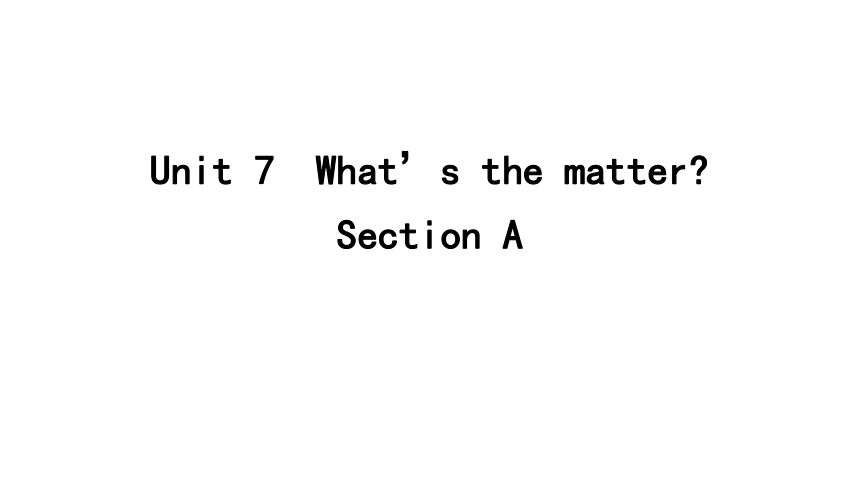
|
|
| 格式 | pptx | ||
| 文件大小 | 214.0KB | ||
| 资源类型 | 教案 | ||
| 版本资源 | 鲁教版 | ||
| 科目 | 英语 | ||
| 更新时间 | 2024-07-06 00:00:00 | ||
图片预览

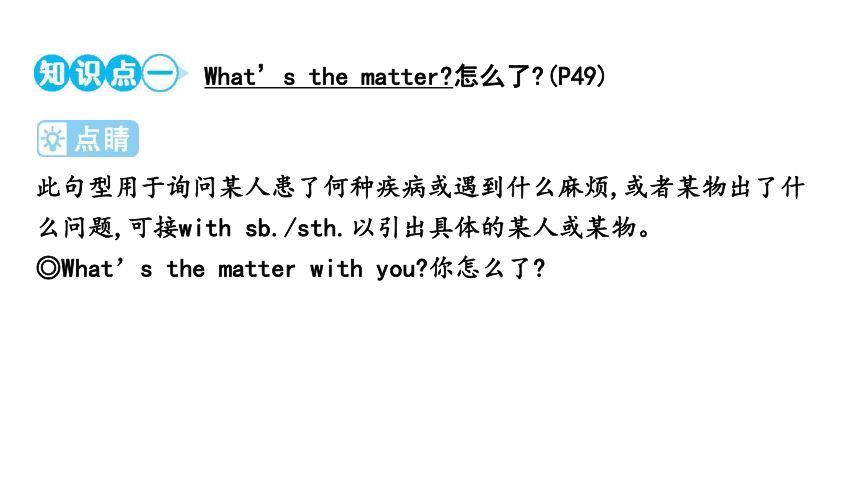
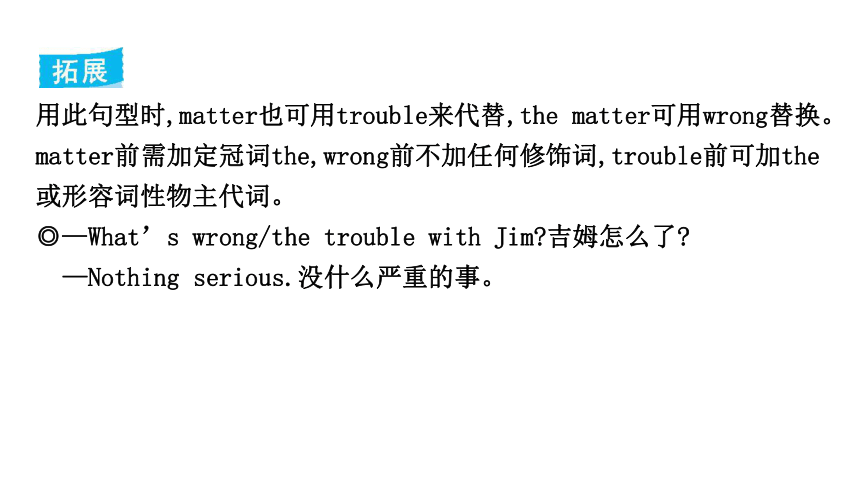
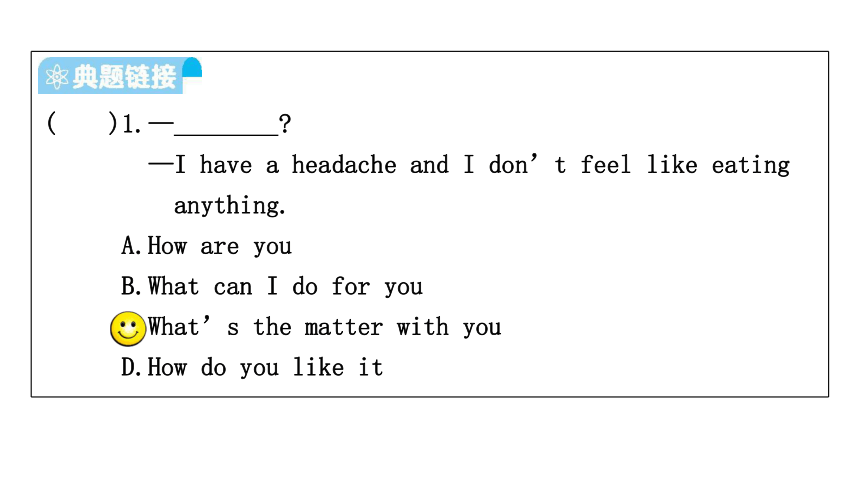
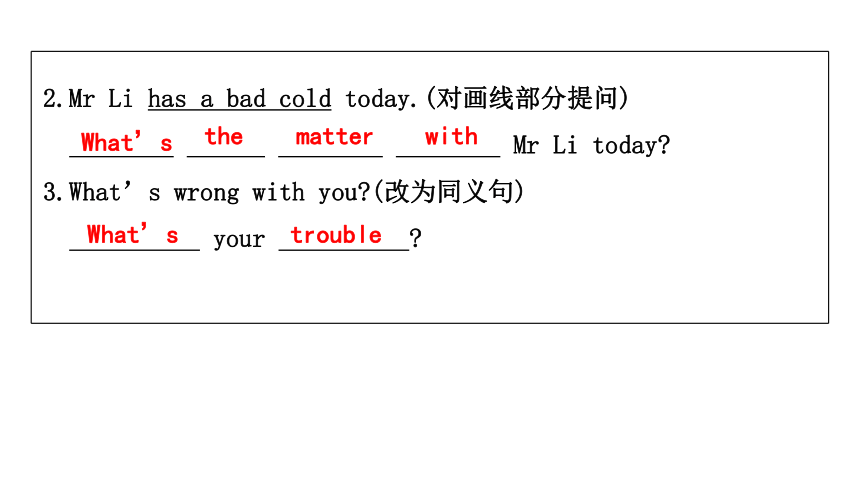
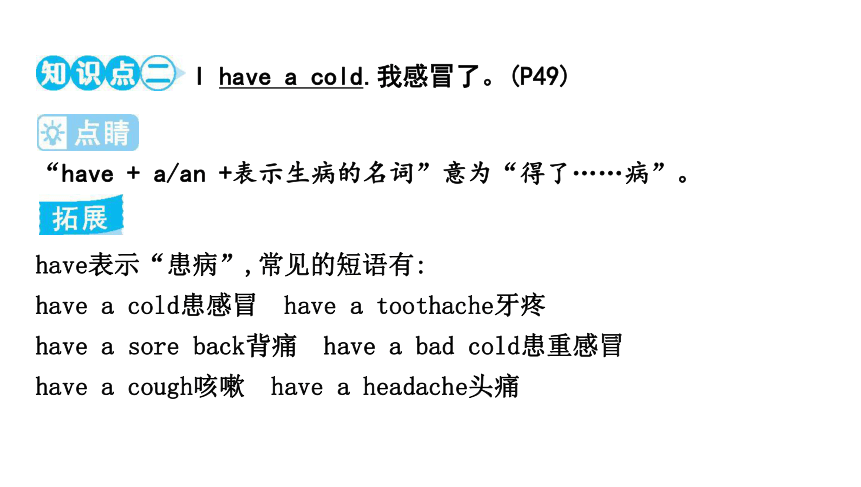
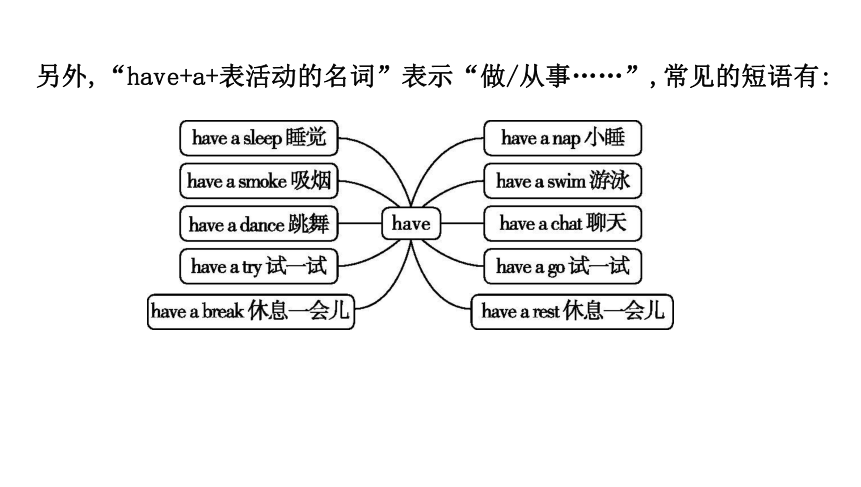

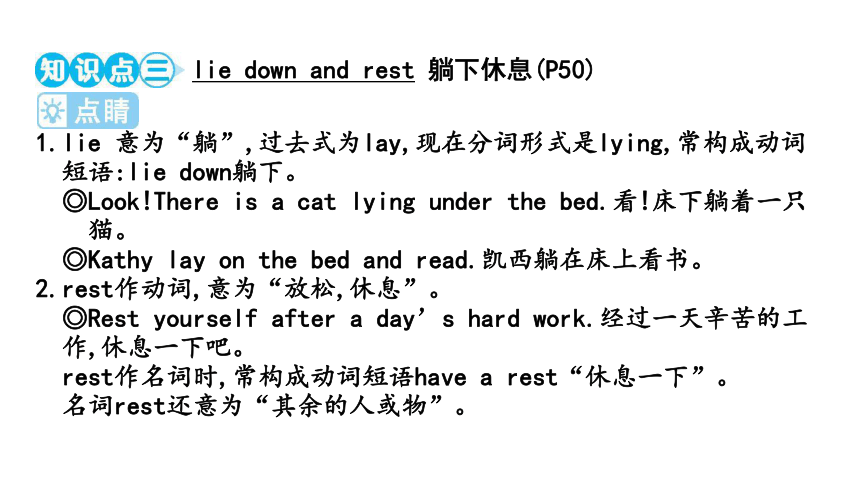
文档简介
(共29张PPT)
Unit 7 What’s the matter
Section A
What’s the matter 怎么了 (P49)
此句型用于询问某人患了何种疾病或遇到什么麻烦,或者某物出了什么问题,可接with sb./sth.以引出具体的某人或某物。
◎What’s the matter with you 你怎么了
用此句型时,matter也可用trouble来代替,the matter可用wrong替换。matter前需加定冠词the,wrong前不加任何修饰词,trouble前可加the或形容词性物主代词。
◎—What’s wrong/the trouble with Jim 吉姆怎么了
—Nothing serious.没什么严重的事。
( )1.—
—I have a headache and I don’t feel like eating
anything.
A.How are you
B.What can I do for you
C.What’s the matter with you
D.How do you like it
2.Mr Li has a bad cold today.(对画线部分提问)
Mr Li today
3.What’s wrong with you (改为同义句)
your
What’s
the
matter
with
What’s
trouble
I have a cold.我感冒了。(P49)
“have + a/an +表示生病的名词”意为“得了……病”。
have表示“患病”,常见的短语有:
have a cold患感冒 have a toothache牙疼
have a sore back背痛 have a bad cold患重感冒
have a cough咳嗽 have a headache头痛
另外,“have+a+表活动的名词”表示“做/从事……”,常见的短语有:
( )1.I have high fever today,so I have to stay
at home for a rest.
A./ B.a C.an D.the
2.我脖子疼得厉害。
I very .
3.如果你的牙还是疼,去看牙医吧。
If you still ,then go to a dentist.
have a
sore neck
have a toothache
lie down and rest 躺下休息(P50)
1.lie 意为“躺”,过去式为lay,现在分词形式是lying,常构成动词
短语:lie down躺下。
◎Look!There is a cat lying under the bed.看!床下躺着一只
猫。
◎Kathy lay on the bed and read.凯西躺在床上看书。
2.rest作动词,意为“放松,休息”。
◎Rest yourself after a day’s hard work.经过一天辛苦的工
作,休息一下吧。
rest作名词时,常构成动词短语have a rest“休息一下”。
名词rest还意为“其余的人或物”。
1.—Where is Li Dong
—He (lie) on the sofa and reading a book.
2.他得躺一会儿让腿休息一下。
He had to for a while to .
3.其余的客人都在大厅。
the guests were in the hall.
is lying
lie down
rest his legs
The rest of
drink some hot tea with honey喝一些加蜂蜜的热茶(P50)
with为介词,意为“有,带有”。
◎China is a country with a long history.中国是一个历史悠久
的国家。
with还有以下用法:
(1)意为“用”,表示使用工具或手段等;
◎He is writing with a pencil.他在用铅笔写字。
(2)意为“和……在一起”,表示陪伴;
◎Can you go home with me 你能与我一起回家吗
(3)意为“随着,与……同时”。
◎The shadow moves with the sun.影子随着太阳而动。
1.那个留长发的姑娘是我妹妹。
2.他用钢笔在上面写了这几个字。
3.He came in with a book in his hand.
The girl with long hair is my sister.
He wrote these words on it with a pen.
他手里拿着一本书进来了。
Section B
have problems breathing 呼吸困难(P53)
have problems(in) doing sth.意为“做某事有困难”。
◎I have problems(in) learning English.我学习英语有困难。
同义表达还有have trouble(in) doing sth.,have difficulty(in) doing sth.。
( )1.The boy has translating the sentence into
Chinese.Please help him.
A.matter B.questions C.problems D.troubles
2.I have trouble (learn) English.
3.It is difficult for me to work it out.(改为同义句)
I it out.
learning
have
difficulty
working
As a mountain climber,Aron is used to taking risks.作为一个登山者,阿伦习惯于冒险。(P53)
be used to doing sth.意为“习惯于做某事”,其中的to 是介词,其后要接名词或v.-ing;若要强调从不习惯到习惯的过程,可用get,become 等代替be。
◎He is used to looking after himself.他习惯于照顾自己。
注意:used to通常不与表示次数(如twice)或一段时间(如two weeks)的词(组)连用。
辨析:used to do sth.,be used to(doing) sth.,be used to do sth.与be used for(doing) sth.
短语 意思
used to do sth. 过去常常做某事
be used to (doing) sth. 习惯于(做)某事
be used to do sth. 被用来做某事
be used for (doing) sth. 被用来做某事
◎My mother used to take a walk after supper,but now she is
used to dancing in the square.我妈妈以前常常晚饭后散步,但
现在她习惯在广场跳舞。
◎The knives are used to cut things.这些刀是用来切东西的。
1.我习惯于打扫房间。
2.The computer is used for playing games.
3.杰克过去留短发。
4.The phone is used to do many things.
I am used to cleaning the room.
电脑被用于玩游戏。
Jack used to have short hair.
电话可用来做很多事情。
So he used his knife to cut off half his right arm.所以他用他的刀割下他的右胳膊的一半。(P53)
1.knife意为“刀”,其复数形式为knives。初中阶段学到的名词变
复数,要改f或fe为v再加-es的词还有:wife(妻子);leaf(叶
子);wolf(狼);shelf(架子);thief(小偷)等。
【助记】
巧记-f(e)结尾变-ves的名词:
树叶(leaf)半(half)数自己(self)黄,
妻子(wife)拿刀(knife)去割粮,
架(shelf)后窜出一只狼(wolf),
就像盗贼(thief)逃命(life)忙。
2.cut off意为“剪下,切掉”。
◎Mary cut off some flowers from the bushes.玛丽从灌木丛
中剪下一些花。
含off的词组:show off炫耀 put off推迟
fall off从……掉下 get off 下车
( )1.The doctor had to his right leg to save
him.
A.cut up B.cut out
C.cut off D.cut down
2.They are not only doctors,but also mothers and
.(wife).
3.Leaves fall off the trees in the autumn.
.
wives
秋天树叶从树上落下来。
His love for mountain climbing is so great that he kept on climbing mountains even after this experience.他如此热爱登山,以至于即便有了这次经历后他仍然坚持登山。(P53)
so...that...引导结果状语从句,意为“如此……以至于……”。so为副词,修饰形容词或副词,that后跟从句。
◎Tom ran so fast that I couldn’t catch up with him.汤姆跑得
那么快,以至于我跟不上他。
辨析:so...that...,such...that...与so that
so...that... 引导结果状语从句,表示“如此……以至于……”,so为副词,修饰形容词或副词
such...that... 引导结果状语从句,表示“如此……以至于……”,such为形容词,修饰名词
so that 引导目的状语从句,表示“以便;为的是”
◎The water was so dirty that we couldn’t drink it.这水太
脏,我们不能喝。
◎She is such a good teacher that we all like her.她是那么
好的一位老师,我们大家都喜欢她。
◎I’ll write down your phone number so that I can’t
forget.我记下你的电话号码,以免忘记。
注意:有时so...that...可以与such...that...互换。
◎She is such a good teacher that we all like her.
=She is so good a teacher that we all like her.
1.Jim is tall enough to pick the apples on the tree.(改为同
义句)
Jim is tall pick the
apples on the tree.
2.To catch the earliest bus,he gets up early in the
morning.(改为同义句)
He gets up early in the morning .
.catch the earliest bus.
so
that
he
can
so
that
he
can
Aron did not give up after the accident and keeps on climbing mountains today.阿伦在这次事故后没有放弃爬山,如今他继续进行爬山运动。(P54)
give up意为“放弃”,后面常跟名词或v.-ing形式。
◎It is good for you to give up smoking.戒烟对你有好处。
注意:give up为“动词+副词”构成的动副结构词组,代词作宾语时,代词要放在中间。
1.吸烟有害健康,请戒掉它。
Smoking is bad for your health.Please .
2.这本书对他来说太难,他最终放弃了阅读它。
The book was too difficult for him.He .
it at last.
give it up
gave up reading
Unit 7 What’s the matter
Section A
What’s the matter 怎么了 (P49)
此句型用于询问某人患了何种疾病或遇到什么麻烦,或者某物出了什么问题,可接with sb./sth.以引出具体的某人或某物。
◎What’s the matter with you 你怎么了
用此句型时,matter也可用trouble来代替,the matter可用wrong替换。matter前需加定冠词the,wrong前不加任何修饰词,trouble前可加the或形容词性物主代词。
◎—What’s wrong/the trouble with Jim 吉姆怎么了
—Nothing serious.没什么严重的事。
( )1.—
—I have a headache and I don’t feel like eating
anything.
A.How are you
B.What can I do for you
C.What’s the matter with you
D.How do you like it
2.Mr Li has a bad cold today.(对画线部分提问)
Mr Li today
3.What’s wrong with you (改为同义句)
your
What’s
the
matter
with
What’s
trouble
I have a cold.我感冒了。(P49)
“have + a/an +表示生病的名词”意为“得了……病”。
have表示“患病”,常见的短语有:
have a cold患感冒 have a toothache牙疼
have a sore back背痛 have a bad cold患重感冒
have a cough咳嗽 have a headache头痛
另外,“have+a+表活动的名词”表示“做/从事……”,常见的短语有:
( )1.I have high fever today,so I have to stay
at home for a rest.
A./ B.a C.an D.the
2.我脖子疼得厉害。
I very .
3.如果你的牙还是疼,去看牙医吧。
If you still ,then go to a dentist.
have a
sore neck
have a toothache
lie down and rest 躺下休息(P50)
1.lie 意为“躺”,过去式为lay,现在分词形式是lying,常构成动词
短语:lie down躺下。
◎Look!There is a cat lying under the bed.看!床下躺着一只
猫。
◎Kathy lay on the bed and read.凯西躺在床上看书。
2.rest作动词,意为“放松,休息”。
◎Rest yourself after a day’s hard work.经过一天辛苦的工
作,休息一下吧。
rest作名词时,常构成动词短语have a rest“休息一下”。
名词rest还意为“其余的人或物”。
1.—Where is Li Dong
—He (lie) on the sofa and reading a book.
2.他得躺一会儿让腿休息一下。
He had to for a while to .
3.其余的客人都在大厅。
the guests were in the hall.
is lying
lie down
rest his legs
The rest of
drink some hot tea with honey喝一些加蜂蜜的热茶(P50)
with为介词,意为“有,带有”。
◎China is a country with a long history.中国是一个历史悠久
的国家。
with还有以下用法:
(1)意为“用”,表示使用工具或手段等;
◎He is writing with a pencil.他在用铅笔写字。
(2)意为“和……在一起”,表示陪伴;
◎Can you go home with me 你能与我一起回家吗
(3)意为“随着,与……同时”。
◎The shadow moves with the sun.影子随着太阳而动。
1.那个留长发的姑娘是我妹妹。
2.他用钢笔在上面写了这几个字。
3.He came in with a book in his hand.
The girl with long hair is my sister.
He wrote these words on it with a pen.
他手里拿着一本书进来了。
Section B
have problems breathing 呼吸困难(P53)
have problems(in) doing sth.意为“做某事有困难”。
◎I have problems(in) learning English.我学习英语有困难。
同义表达还有have trouble(in) doing sth.,have difficulty(in) doing sth.。
( )1.The boy has translating the sentence into
Chinese.Please help him.
A.matter B.questions C.problems D.troubles
2.I have trouble (learn) English.
3.It is difficult for me to work it out.(改为同义句)
I it out.
learning
have
difficulty
working
As a mountain climber,Aron is used to taking risks.作为一个登山者,阿伦习惯于冒险。(P53)
be used to doing sth.意为“习惯于做某事”,其中的to 是介词,其后要接名词或v.-ing;若要强调从不习惯到习惯的过程,可用get,become 等代替be。
◎He is used to looking after himself.他习惯于照顾自己。
注意:used to通常不与表示次数(如twice)或一段时间(如two weeks)的词(组)连用。
辨析:used to do sth.,be used to(doing) sth.,be used to do sth.与be used for(doing) sth.
短语 意思
used to do sth. 过去常常做某事
be used to (doing) sth. 习惯于(做)某事
be used to do sth. 被用来做某事
be used for (doing) sth. 被用来做某事
◎My mother used to take a walk after supper,but now she is
used to dancing in the square.我妈妈以前常常晚饭后散步,但
现在她习惯在广场跳舞。
◎The knives are used to cut things.这些刀是用来切东西的。
1.我习惯于打扫房间。
2.The computer is used for playing games.
3.杰克过去留短发。
4.The phone is used to do many things.
I am used to cleaning the room.
电脑被用于玩游戏。
Jack used to have short hair.
电话可用来做很多事情。
So he used his knife to cut off half his right arm.所以他用他的刀割下他的右胳膊的一半。(P53)
1.knife意为“刀”,其复数形式为knives。初中阶段学到的名词变
复数,要改f或fe为v再加-es的词还有:wife(妻子);leaf(叶
子);wolf(狼);shelf(架子);thief(小偷)等。
【助记】
巧记-f(e)结尾变-ves的名词:
树叶(leaf)半(half)数自己(self)黄,
妻子(wife)拿刀(knife)去割粮,
架(shelf)后窜出一只狼(wolf),
就像盗贼(thief)逃命(life)忙。
2.cut off意为“剪下,切掉”。
◎Mary cut off some flowers from the bushes.玛丽从灌木丛
中剪下一些花。
含off的词组:show off炫耀 put off推迟
fall off从……掉下 get off 下车
( )1.The doctor had to his right leg to save
him.
A.cut up B.cut out
C.cut off D.cut down
2.They are not only doctors,but also mothers and
.(wife).
3.Leaves fall off the trees in the autumn.
.
wives
秋天树叶从树上落下来。
His love for mountain climbing is so great that he kept on climbing mountains even after this experience.他如此热爱登山,以至于即便有了这次经历后他仍然坚持登山。(P53)
so...that...引导结果状语从句,意为“如此……以至于……”。so为副词,修饰形容词或副词,that后跟从句。
◎Tom ran so fast that I couldn’t catch up with him.汤姆跑得
那么快,以至于我跟不上他。
辨析:so...that...,such...that...与so that
so...that... 引导结果状语从句,表示“如此……以至于……”,so为副词,修饰形容词或副词
such...that... 引导结果状语从句,表示“如此……以至于……”,such为形容词,修饰名词
so that 引导目的状语从句,表示“以便;为的是”
◎The water was so dirty that we couldn’t drink it.这水太
脏,我们不能喝。
◎She is such a good teacher that we all like her.她是那么
好的一位老师,我们大家都喜欢她。
◎I’ll write down your phone number so that I can’t
forget.我记下你的电话号码,以免忘记。
注意:有时so...that...可以与such...that...互换。
◎She is such a good teacher that we all like her.
=She is so good a teacher that we all like her.
1.Jim is tall enough to pick the apples on the tree.(改为同
义句)
Jim is tall pick the
apples on the tree.
2.To catch the earliest bus,he gets up early in the
morning.(改为同义句)
He gets up early in the morning .
.catch the earliest bus.
so
that
he
can
so
that
he
can
Aron did not give up after the accident and keeps on climbing mountains today.阿伦在这次事故后没有放弃爬山,如今他继续进行爬山运动。(P54)
give up意为“放弃”,后面常跟名词或v.-ing形式。
◎It is good for you to give up smoking.戒烟对你有好处。
注意:give up为“动词+副词”构成的动副结构词组,代词作宾语时,代词要放在中间。
1.吸烟有害健康,请戒掉它。
Smoking is bad for your health.Please .
2.这本书对他来说太难,他最终放弃了阅读它。
The book was too difficult for him.He .
it at last.
give it up
gave up reading
同课章节目录
- Unit 1 Do you want to watch a game show?
- Section A
- Section B
- Unit 2 I'm going to study computer science.
- Section A
- Section B
- Unit 3 Will people have robots?
- Section A
- Section B
- Unit 4 How do you make a banana milk shake?
- Section A
- Section B
- Unit 5 Can you come to my party?
- Section A
- Section B
- Unit 6 If you go to the party, you'll have a great
- Section A
- Section B
- Unit 7 What's the matter?
- Section A
- Section B
- Unit 8 I'll help to clean up the city parks.
- Section A
- Section B
